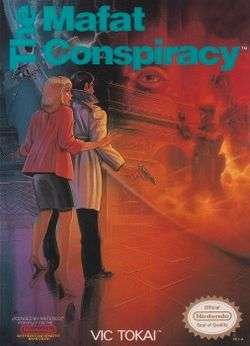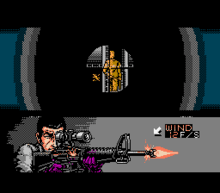The Mafat Conspiracy
| The Mafat Conspiracy | |
|---|---|
 North American cover art. Illustrated by Lawrence Fletcher | |
| Developer(s) | Aicom |
| Publisher(s) | Vic Tokai |
| Composer(s) | Toshiko Tasaki |
| Series | Golgo 13 |
| Platform(s) | NES |
| Release date(s) | |
| Genre(s) | Action adventure |
| Mode(s) | Single-player |
The Mafat Conspiracy (ゴルゴ13 第二章イカロスの謎 Gorugo Sātīn Dai-Nishou Ikarosu no Nazo, Golgo 13 Episode 2: The Riddle of Icarus) is a Nintendo Entertainment System video game released in 1990. It is the sequel to Golgo 13: Top Secret Episode. Its cover art was illustrated by Lawrence Fletcher.
Plot
A weapons satellite has been snatched out of orbit, and the world is facing nuclear destruction. Behind this act is a group of terrorists known as the Mafat Conspiracy. The terrorists plan to extort the U.S. and Soviet governments by threatening to make their satellites fall from space. The Mafat are demanding that the Soviets turn over their research on electromagnetic waves, and the American government to give them the Los Angeles, a ship that is equipped with nuclear warheads.[1]
The CIA and KGB are blaming each other, and Golgo 13's mission is to eliminate the leader of the Mafat Revolutionary Group, destroy the Satellite Capture System, and rescue Dr. Barrows. The doctor was kidnapped from his lab in England many years ago and taken to Paris, where he remains in confinement.
Gameplay

The action in this game takes place on five different types of screens: horizontally scrolling action, stationary action, driving a Ferrari, maze navigating, and sniper rifle shooting. The scrolling levels pit the player against a number of enemies, including enemies armed with pistols, machine guns, scythes, boomerangs, grenades, and knives. The player will also face scorpions, and dogs. To fight the good fight, the player is armed with a gun and can pick up extra ammo along the way. The player can also kick his enemies.
The stationary screens let the player kick and punch the enemies, which include Arm of Mafat, who's inside the Mafat hideout, Bodyguard, who protects Ahmad Khan, and Canine, who awaits the player at the Mafat base. In addition to fighting enemies in the scrolling and stationary levels (both of which are timed), the player will also do a lot of running and jumping.
The action scenes involving the Ferrari and the maze navigation employ the use of a 3D perspective. The Ferrari portion of the game is a timed race in which the player views the action from behind the car. He can shift gears and throw hand grenades at cars containing agents that are working for the KGB. In the mazes, the player can fire upon pistol-shooting, grenade-throwing and machine gun-toting bad guys while exploring the various hallways and rooms. The player can find extra bullets and an infrared scope that gives him night vision.
The Sniper Screen, which makes use of your experience as an assassin, features a close-up of the player aiming a gun and in the background a close-up of the target site. When the player is aiming his gun and preparing to fire, he should take into consideration the wind speed and direction.
Throughout this game, a member of the CIA who goes by the name of James will provide the player with information on the enemies and on the location of Dr. Barrows. He will also provide the player with special weapons that you may request. Agent Sylvia also lends a helping hand.
Censorship
The first game was censored, but still featured content that seemed to be in violation of Nintendo's own content guidelines. A similar situation occurred with this sequel; while some content was modified from its original Japanese edition, certain depictions and or references were typically not seen in games made for a Nintendo system.